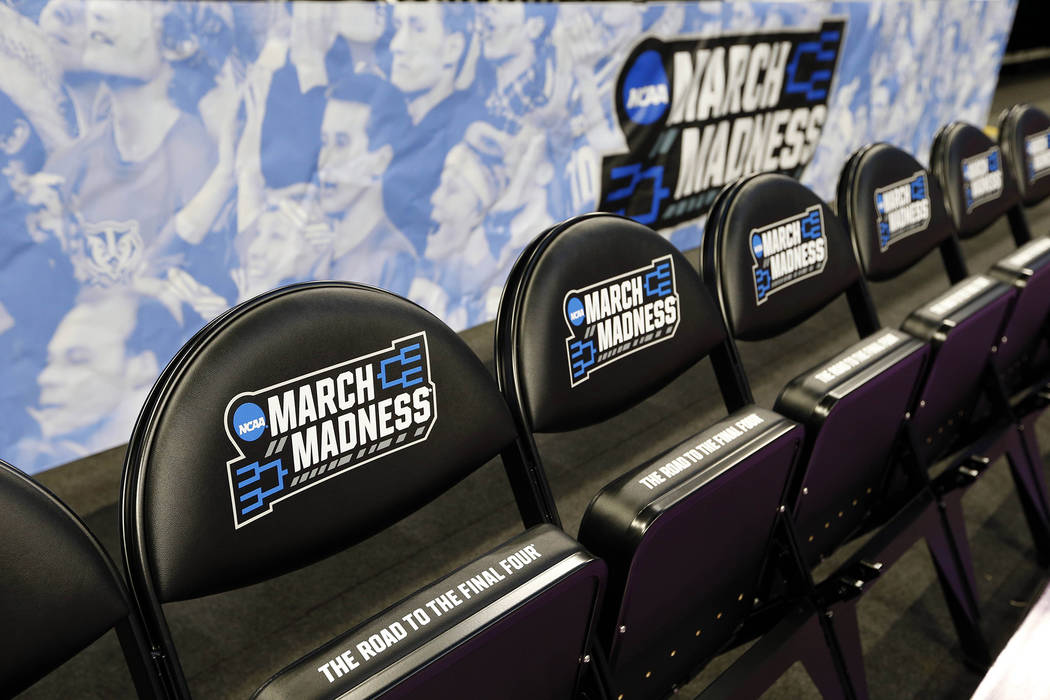Group says most of $10B bet on March Madness will be illegal
The American Gaming Association believes $10 billion will be bet on the NCAA men’s basketball tournament, and only 3 percent of that will be wagered legally.
Most of the betting money that will change hands as 68 teams vie for a national championship beginning Tuesday night will occur in office pools and bracket contests that are illegal in most states.
But the association representing the $240 billion casino industry used the kickoff of March Madness to highlight its fight to repeal the federal Professional and Amateur Sports Protection Act and legalize sports wagering nationwide.
“Most of this activity, it turns out, is likely illegal, whether it should be or not,” said Geoff Freeman, president and CEO of the Washington-based association. “A recent AGA-commissioned legal analysis found that pool betting, including March Madness brackets and most casual betting between two or more people, is generally illegal in 37 of our 50 states. In several states, it can be considered a felony.”
Leading PASPA fight
For two years, the association has led the fight to repeal the PASPA, which makes sports wagering illegal in all but four states. The U.S. Supreme Court heard arguments in New Jersey’s challenge to the law in December, and the association and the industry are anxiously awaiting a decision within the next few weeks.
“Clearly, the federal government does not own a monopoly on bad gaming policy,” Freeman said in a conference call Monday. “States are also making common criminals of American consumers who simply want to enjoy a great American sporting event, like March Madness.”
Freeman said an estimated 54 million people — nearly one-quarter of American adults — participated in some form of sports pool last year. Pool participants entered an average of more than seven different pools over the course of the last year, and their total spend across all sports was nearly $18 billion.
But the NCAA basketball tournament is one of the year’s betting highlights, with more wagered in total in the 67 tournament games than in the Super Bowl. In the past year, an estimated 24 million people filled out nearly 60 million pool entries and spent more than $2.6 billion on entry fees for those pools.
In his conference call, Freeman said 18 states are working toward making sports wagering legal within their borders with 48 pieces of legislation should the Supreme Court overturn or modify the PASPA. West Virginia legislators last week approved a bill to legalize single-game sports betting, and the New York Senate is set to debate sports wagering legislation Tuesday.
‘Integrity fees’
A new twist in efforts to legalize sports betting is the sports leagues’ lobbying of legislatures to impose “integrity fees” on all bets as a source of revenue to the leagues. In West Virginia, Gov. Jim Justice didn’t sign the veto-proofed legislation legalizing sports betting there. The law was enacted without his signature, but Justice indicated in a letter he may call lawmakers into a special session to consider adding a 0.25 percent integrity fee.
The National Basketball Association and Major League Baseball are pressing the most for a new fee for their benefit.
“Frankly, I see the integrity fee as a bit of a red herring,” Freeman said.
He said a fee to benefit leagues won’t help the industry accomplish its stated goal of driving wagers to legal casinos and away from corner bookies and offshore casino sites.
If integrity fees were legislated on the federal level, the move could actually drive bettors to illegal sources, because legal casinos presumably would pass the expense on to customers.
Sportsbook operators in Las Vegas have said they operate on tight margins already, receiving around 5 percent from the handle by taking a commission called “vigorish” from every bet placed.
Contact Richard N. Velotta at rvelotta@reviewjournal.com or 702-477-3893. Follow @RickVelotta on Twitter.























